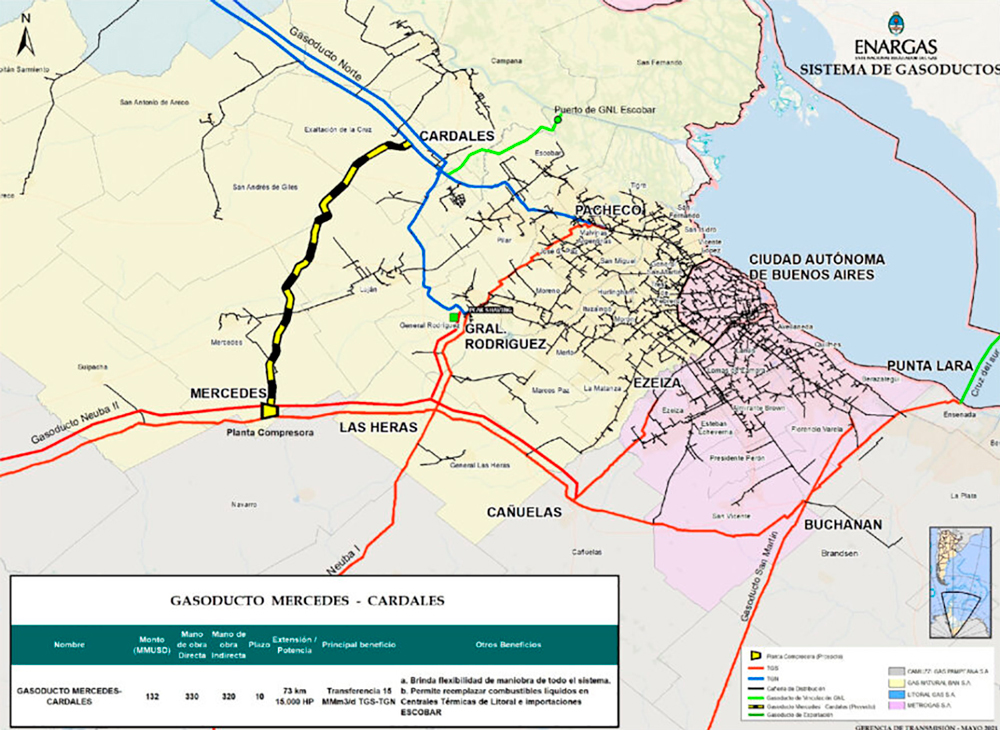May 2023, Vol. 250, No. 5
Features
Spotlight on Argentina: Projects to Strengthen Gas Service in Northern Region
By Mauro Nogarin, P&GJ Correspondent, South America
(P&GJ) — The government of Argentina decided to accelerate the reversal works of the Northern Gas Pipeline, which will guarantee supply to the entire north of Argentina, as well as allowing for exportation to Chile from the Vaca Muerta.
This project, contemplated in the Transport.Ar Gas Pipeline System Program, has now become a priority due to the sharp reduction in Bolivian natural gas exports to Argentina in the last two years, due to the decline in its deposits.
In addition, the reversal of the North Pipeline will also allow exports to Brazil through the Juana Azurduy Integration pipeline.
The Gasoducto del Norte, inaugurated in 1960, is a 900-mile (1,450 km) pipeline, with a north-south orientation and a capacity of 998 MMcf/d (28 MMcm/d) of natural gas from Campo Durán (Salta) to San Jerónimo (Santa Fe) and supplies eight provinces: Salta, Jujuy, Tucumán, Santiago del Estero, Catamarca, Córdoba, Santa Fe and Buenos Aires.
The project, Reversión del Gasoducto del Norte, consists of the adaptation of the Leones and Tío Pujo compression plants and the construction of the new 24- and 30-inch lines, along with their respective suction and discharge valves and pressurization systems, the connection to the main gas pipeline and its respective control system.
Once the construction of the loops is completed, hydraulic tests will be carried out in one location of Section 10 and in two locations of Section 11. The plan is to be able to operate the gas pipeline at a pressure of 61.7 kilograms per square centimeter (kg/cm2).
The second important work on the project consists of the construction of the transportation system of the NEUBA II Gas Pipeline, which is currently at its maximum capacity.
It has been expanded in recent years through the construction of parallel sections; however, the continuous increase in demand has generated the need to carry out the construction of this new extension.
The project consists of the expansion of part of the gas transportation system through the construction of a 23.6-mile (38-km) loop, associated with the NEUBA II Gas Pipeline, located in the municipality of Carlos Casares, province of Buenos Aires.
The 36-inch loop will be 10-mm thick and lined with three-layer extruded polyethylene. The welded joints will be covered with three-layer, heat-shrinkable blankets.
The project will also utilize an existing loop located near the Ordoqui compression plant. In the initial portion of the 17-mile (28-km) stretch, a blocking valve will be installed and a receiving scraper trap will be put in place.
The new loop will be housed 49.2 feet (15 meters) from the existing main gas pipeline and will be buried at least 6.5 feet (2 meters) deep at crossroads or waterways. Finally, the loop will be subjected to hydrostatic resistance and tightness tests.
The route of the 30-inch pipeline crosses the towns of Navarro, Mercedes, Luján, San Andrés de Giles, Exaltación de la Cruz and Zárate.
The section construction project covers 1.6 miles (80 km), from the Mercedes compression plant, where it is connected to the Mercedes Cardales measurement station.
The Mercedes-Cardales Gas Pipeline will allow additional volumes of to enter the coastal zone and to give greater flexibility to the transfer between the transportation systems operated by Argentina operators TGS and TGN in the province of Greater Buenos Aires.
The pipeline will have NPS 30 line blocking valves, complete with by-pass, vents and an automatic shutdown system in case of line break (line-break).
The Mercedes Compression Plant (PCM) is designed to transport 530 MMcf/d (15 MMcm/d) under normal operating condition, however and projected to increase the future flow to a maximum of 883 MMcf/d (25 MMcm/d).






Comments